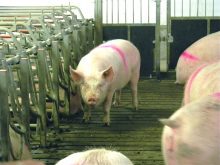Epigenetic factors are identified as key to reducing crop losses because of rain and high humidity
Researchers at the University of McGill believe they are a step closer to understanding what causes pre-harvest sprouting (PHS) in cereals, a phenomenon that costs the global wheat industry as much as $1 billion annually.
Scientists have until recently focused on genetic factors and on the interaction between genotypes and the environment in the effort to breed varieties that are resistant to PHS.
McGill researchers now suggest that the solution may lie not with genetics alone, but rather with a combination of genetic and external or epigenetic factors. The team, led by Professor Jaswinder Singh of McGill’s department of plant science, has identified a key gene that acts as a switch to determine how a particular plant will respond to high humidity and excess rainfall by either germinating early (PHS) or not.
Read Also

Mazergroup’s Bob Mazer dies
Mazergroup’s Bob Mazer, who helped grow his family’s company into a string of farm equipment dealerships and the main dealer for New Holland machinery in Saskatchewan and Manitoba, died July 6 from cancer.
This switch is to be found in a key gene pathway.
“The complex RdDM machinery is composed of several proteins that guide the genome in response to growth, developmental and stress signals. It’s a bit like the plant’s brain,” Singh said in a release. “Although in the past scientists have identified it as the pathway that regulates the way a variety of genes is expressed, until now no one had made the link with PHS.”
The McGill team made the discovery by using a variety of genomic and molecular tools to identify specific genes, and then comparing the way that these genes are expressed in PHS-resistant versus PHS-susceptible varieties of wheat.
“This discovery is important for other cereals like barley as well as for wheat,” said Surinder Singh, a PhD student working on the project.
“This means that not only should we be able to avoid the ugly bread and sticky crumbs produced by PHS wheat in future, we should also end up with better beer.”
The research was funded by the Natural Sciences and Engineering Research Council of Canada (NSERC).


















